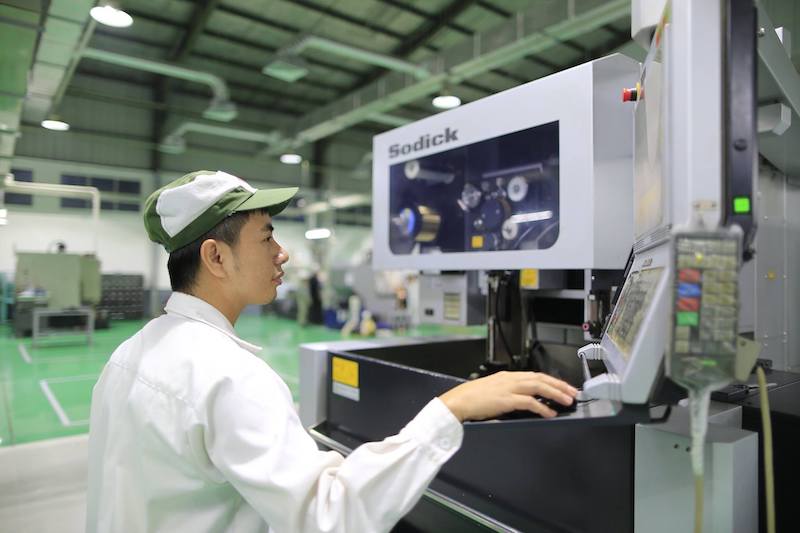FIEs in need of skilled workers in Vietnam
Local businesses need to optimize their operation and production to be more effective and safer.
Most of the foreign-invested enterprises (FIEs) in Vietnam will accelerate the application of new technology and automation in production and business activities in the next three years. This will strongly affect the demand for labor skills and skilled jobs in the market, local experts said.
| FIEs in Vietnam will recruit skilled workers for their operation towards automation. Photo: ILO Vietnam |
Speaking at a webinar announcing results of a relevant survey on July 22, Bui Ton Hien, Director of the Institute of Labor and Social Affairs under the Ministry of Labor, Invalids and Social Affairs (MoLISA) said the Covid-19 pandemic will continue to be more complicated this year and the world has not yet reached the “new normal” phase.
“Local businesses will have to optimize their operation and production to be more effective and safer,” he added.
The latest survey entitled “Skills gap in the manufacturing and processing industry” revealed 94% of more than 200 FIEs respondents planned to lean more towards automation in the 2021-2023 period, of which about 41.5% of them will invest in cutting-edge technologies at a high and very high level.
The year 2020 marked an important milestone in the economic and social context of Vietnam as the country suffered from several impacts from the Covid-19 pandemic.
Though the manufacturing and processing industry continues to play a key role in leading economic growth, local experts shared their views at the above webinar with a theme “The situation and demand of working skills at FDI manufacturing and processing businesses in Vietnam in the 2021-2023 period”.
In particular, industrial manufacturing and processing in the fourth quarter of 2020 continued to maintain a higher growth momentum than previous quarters, bringing significant contributions to the economic recovery prospects.
Being an Asian country with strong international integration and young abundant workforce, Vietnam has continued attracting strong FDI capital, creating more business and job opportunities, according to ManpowerGroup Vietnam.
| An overview of the webinar co-held by the (MoLISA) and ManpowerGroup Vietnam |
Simon Matthews, Regional Manager of ManpowerGroup Vietnam, Thailand & Middle East said Vietnam has steadily turned into a manufacturing hotspot in Asia, due to its relatively large and cost-competitive workforce, attractive tax regime, stable political environment, geographical advantages, and open trade policies.
“Foreign firms have planned to expand manufacturing operations in Vietnam in an effort to diversify supply chains. This will bring about great opportunities for Vietnam to develop manufacturing to the next level, creating thousands of meaningful jobs for the local workforce,” Matthews added.
In the face of the current increasing wave of foreign investment in Vietnam, it is forecast that the human resource structure will have a fundamental change when FDI flows into industries that require medium to high skilled workers, instead of the low or unskilled workforce.
The survey noted nearly half of the workers (46%) in the FDI businesses are doing low-skilled or simple jobs and this percentage is notably high in the motorbike/automobile assembling, textile, and electronics industries. Around one-third of the laborers have medium to lower medium skills (office workers/ services and sales, assembling technicians, and equipment operators).
Work ethics, discipline at work, and professional/technical skills are rated as very important by manufacturing FIEs joining the survey. In addition, foreign language ability plays a critical role at FDI businesses, however, it is rated the lowest in the group of skills surveyed.
The top skills that businesses find the most difficult to recruit are professional/technical skills, foreign language skills, analytical, logical, and critical thinking, creativity, initiating skills, leadership/ management, decision-making skills, problem solving/conflict management skills.
Due to the technological disruption, Matthews recommended the employers would need to develop an effective and holistic workforce strategy.
“As the world of work is changing fast and it becomes more and more challenging to find workers with suitable skills, organizations must build, bridge, and borrow the skill sets they need. That will be critical for their success in the short, medium, and long term, especially in the digital age,” he said.











